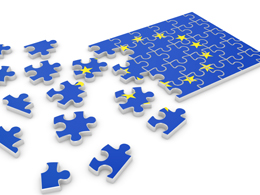 I’m writing this in response to a comment on an earlier post about Europe, which essentially asked: Where does the U.S. fit in all this? A good question, and one that demands a further look.
I’m writing this in response to a comment on an earlier post about Europe, which essentially asked: Where does the U.S. fit in all this? A good question, and one that demands a further look.
Right now, the U.S. is in the process of trying to bang heads together to get a settlement between Greece (and the rest of the Southern European countries) and Germany (and the rest of the Northern European countries). Although this confrontation is essentially between Greece and Germany, that’s only because they’re at two ends of a continuum. Greece is a more extreme case of Italy, Spain, and even France, so any settlement that benefits Greece will also benefit those countries. Similarly, Germany is an extreme case of the Netherlands, Austria, and even the UK, and any settlement that costs Germany will cost those countries as well.
We can see this as a cage match between Germany and Greece, but there are teammates outside the cage who may end up being brought in.
Our ongoing role in Europe
The role of the U.S. in Europe has evolved over time. After World War I, the U.S. washed its hands and left the Europeans to themselves—with World War II as a result. Consequently, after the war, the U.S. government concluded it would ultimately cost less in treasure and lives to stay involved and help Europe rebuild by acting as a primary export market and as a neutral third party to mediate European disputes before they got out of control.
Fast-forward 70 years, and Europe has recovered to the point that it’s actually a wealthier and larger economy than the U.S. It's also made real progress toward the kind of integration that would prevent major wars in the future. Until about five years ago, it appeared the U.S. role was no longer necessary.
Then the financial crisis hit, and the debt-financed European boom collapsed. It was easy for everyone to agree when there were no hard choices to be made. But now that everyone can’t have a bigger slice of the pie every year, old antagonisms are resurfacing. When Germany, for example, uses its economic primacy to try and take political control, lots of bad old memories awaken throughout the continent. Russia’s military activity in Europe awakens even more bad memories and places Europe under even more pressure.
The European political structure, which has done so much to tie countries together and reduce the risk of war, is now under the worst stress it has ever seen. The Greeks may be determined to push the union to the breaking point, and the Germans may be willing to let them. If that happens, one of the biggest forces for stability and peace in a deeply divided continent might simply collapse. Not immediately, of course, but the trend would be clear.
The referee between Germany and Greece
The role of the U.S. is to do everything it can to bring Greece and Germany together in a deal that acknowledges the very real cases and problems of both countries. No one would benefit from a European political collapse, and the U.S. is the only participant that may have the authority, the neutrality, and the will to make all parties see reason. This is the right thing to do for everyone, including us.
Unfortunately, it’s unclear where Europe is headed, even beyond the current confrontation. Tomorrow I will review an excellent book on Europe by one of my favorite geopolitical analysts, George Friedman. Mr. Friedman has a great deal to say about Europe (and relatively little of it is hopeful).
Personally, I believe the U.S. is at least in a position to help Europe continue to buy time, and that some sort of deal will be cut—but quite possibly one that ends up leaving the real issues on the table. Even with a short-term deal, the U.S. should continue trying to strong-arm the Europeans into working with each other. As history has shown, it's not something they’re very successful at doing on their own.


 Print
Print


